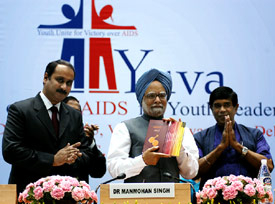News
New Tool to Increase HIV/AIDS Awareness Among India's Youth
- 09 December 2005
News
UNITED NATIONS, New York — Young people in India can now easily access information on how to build up their life skills against HIV infection and help change the course of the HIV epidemic, both in their communities and their country. The information, contained in a recently released handbook, also answers some of their frequently asked questions about the infection.
"Quest on HIV & AIDS: A Handbook for Young People" was released by Indian Prime Minister Manmohan Singh during the National Youth Convention, held in New Delhi in observsance of World AIDS Day on 1 December. The Convention was organized by the National AIDS Control Organization (NACO) and attended by about 1,500 youth leaders from different political parties all over the country.

The handbook, developed by NACO in collaboration with UNFPA, the United Nations Population Fund, clarifies myths and misconceptions on HIV/AIDS and related health issues. In addition to information on adolescence, sexuality, and reproductive health, the handbook contains basic facts about HIV/AIDS, including its situation globally and in India, information on the vulnerability of young women and men, responses of the Government and other agencies, and ways that young people can make a difference in fighting the epidemic.
The publication also contains Frequently Asked Questions on growing up; relationships; reproductive health and sexuality; drug abuse; sexually transmitted infections; HIV/AIDS transmission, symptoms and treatment; using condoms to prevent infection; and HIV and young women. A small dictionary explains technical and non-technical words related to sexuality and HIV/AIDS, and a resource list provides names of some useful websites.
The handbook is an outcome of the National Students and Youth Parliament Special Session on HIV/AIDS, held in November 2004. It is intended to be a useful tool for strengthening Government programmes for young people and to serve as a resource material for non-governmental organizations and civil society.
Contact Information:
New York: Omar Gharzeddine, +1 212-297-5028, gharzeddine@unfpa.org
UNFPA Representative in India: Hendrik van der Pol, vanderpol@unfpa.org
UNFPA India: Radhika Kaul Batra, kaulbatra@unfpa.org
New York: Abubakar Dungus, +1 (212) 297-5031, dungus@unfpa.org